
GLOSSARY
There are two Abaturs, or rather two phases of the same being. Abatur Rama (the Lofty or Celestial Abatur), but with his lower counterpart, Abatur of the Scales, who weighs souls after death.
Adam
There are two Adams, the physical and the occult or spiritual Adam (Adam Pagria and Adam Kasia). The former pair inhabit Msunia Kusta, a world which is the spiritual counterpart of the material world, and their progeny are the spiritual counterparts of human beings. The physical Adam is the first man.
Adatan and Yadatan
A pair of celestial spirits often mentioned in Mandaean literature. Accent is on the last syllable
Ahaba d Mania <Pr. Hava d Mani>
The Giving of Garments. A form of Zidqa brikha for those who have died not wearing the ritual garment
Adnaut Hiia <Pr. Admuth Hei>
" Likeness-of-Life ", a female spirit mentioned in the Ginza Rabba and 'Niania. In the latter she is said to be the mother of Yusamin.
Aina “The well spring” <Pr. Eye-na>
The name given to the female principle of creation “the Mother”. Her complement is the Sindirka, the palm-tree (See Sindirka)
Anatan <Pr. Anna-tan>
Name of a ruler in the infernal region, husband of Qin.
Andiruna
A ritual hut built for marriage rites and the consecration of a priest
Anhura (nhura)
Light
Anus <Pr. Annosh>
One of the three sons of the Occult Adam and Eve. The other two are called Hibil and Sitil. In the Diwan Abatur one of Ptahil’s seven sons is called Anus.
Arspan
The name of a Spirit connected with water and baptism, also connected to the name of a throne.
Asganda, Sganda <Pr. Ash-zan-da or shgan-da>
A helper, assistant, acolyte: i.e. a boy or young man of priestly birth who assists at Mandaean rites. His duties resemble those if a server, or, sometimes a deacon in Oriental Christian churches (Cf. Sumerian as-gan-da “minister, messenger” and Akkadian asganda.
Asuta <Pr. Ass-u-tha>
Healing, health. The idea of being cleansed or clean is implied.
Aswalia
see sualia
Ba <Pr. Ba>
A name given to the dove sacrificed before a masiqta. A shred of its flesh is eaten. It must have a small ridge or protberence at the base of the beak.
Bhaq
One of Ptahil's sons. A demiurge named Bhaq is mentioned in the Ginzna, Rabba.
Bhira <Pr. Bhira>
(" proven" or " chosen "). A spirit called Bhira Dakia, chief of all the 'uthras appears in the 'Niania and Sarh d Qabin d Sislam Rba.
Bihdad <Bih-dad>
Here this is the name of the 'uthra assisting Abatur at the Scales.
Bihram <Pr. Bih-ram>
Is named at baptism- " I am baptized with the baptism of Bihram the Great ". Bihram or Bahram (the Great) is often mentioned: his name suggests Persian origin. The banner is sometimes called Bihram.
Bimanda = bit manda <Pr. Bi-man-da>
Place of religious ceremonies. For which bit maskna is a synonym or skinta. The cult hut which after purification and consecration may not be entered by a layman. It is constructed of mud and reeds and stands in the north part of the enclosure known as the mandi or manda.
Fire saucer
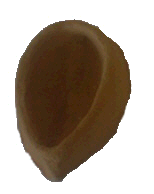
Bukra <Pr. Bukh-ra>
First born elder. A name given to a ganzibra’s first postulant to priesthood.
Burzina
Turban
Butha (plural butha or bawatha)
Petition, prayer, a section in the Book of Devotions
Deywa (plural Deyvi) Written daiwa
A div, an evil Spirit
Dubahata <pR. Dabba-hatha>
= d abahata “of the fathers” or “of the parents” <Pr
Refers to the final masiqta performed on the last day of Panja
Dubahatan qadmaiia <Pr. Dabba-ha-than qad-moyyi>
= “of our fathers” i.e. the long prayer of commemoration recited for the dead and the living at all sacraments for the dead.
Dmut, dmuta <Pr. Ad-muth, ad-mutha>
“Likeness, counterpart, image” usually refers to the spiritual or ideal counterpart or double of everything and everyone in the material world. A person’s dmuta sometimes acts, as a guardian angel Msunia Kusta is the ideal counterpart of the earthly world.
Drabsa <Pr. Drav-sha or draf-sha>
“A banner, standard, streamer, pennon, banner, ray or beam of light”. The banner is used in ritual.

Dukrana (mentioning). <Pr. dukh-rana>
(a) Naming a dead person at a ritual meat or is prayer of commemoration
(b) A sacrament commemorating a person or persons by name.
EHshukha
(see Hshukha)
Fatira (plural fatiria)<Pr. fut-ira, plu. fut-ir-i.>
A disc of unleavened bread. The size varies. The fatira used in the masiqta are saltless, small and receive only a token baking. Word means also departed.
Gaf (Gaff)
A ruler of one of the underworlds and father of 'Ur by Ruha
Ganzibra (plural--ganzibria). < Pr. gan-ziv-ra or gan-za-o-wra --plural gan-zivri>
Literary "treasurer"- The ganzibra is a degree higher in rankthan a tarmida, priest. Lidzharski translated the word "bishop".
Ganzi'il, Ginzi’il, Kanzi’il (and variations)
A personification of hidden or secret treasure, often invoked in exorcisms and spells.
Gdada
White cloth to insulate contamination or protect from contamination
Ginza (plu. ginzia). <Pr. Gin-za plu. Gin-zi)
(a) A treasure, mystery, sacrament
(b) food and drink for ritual meals, cult objects generally;
(c) a library of holy books, hence Ginza Rba (plu.. Ginza Rabba) the name or a miscellany of sacred texts in a single volume
(d) “what is hidden and precious”
Giu
Ruler of one of the underworlds
Habsaba <Pr. Ho-shabba>
A savior spirit. Is the personification of the first day of the week.
Haiasum <Pr. (Hayya-sho>)
An 'uthra, often mentioned in the 'Niania and Ginza Rabba.
Hallali
A ritually and racially pure Mandaean
Hamra (wine) <Pr. ham-ra>
The hamra drunk at Mandaean sacraments is not fermented: as used at a marriage ceremony it is water into a cup of which. Just before the ceremony the ganzibra macerates raisins and dates, the former being symbolic of female fecundity and the latter (see sindirka) of male fertility. The hamra into which water is poured at a masiqta is prepared in the same way but without dates. Four raisins or grapes are placed in a small bowl of water and macerated. In this case, the wine-cup represented the Mother.
Hawa <Pr. Ha-wa>
Eve, wife of Adam. There were two Eves (see Adam) the Pagria and the Kasia. In this manuscript a Hawa daughter of Hawa is a common name amongst Mandaean women.
Hawan
Mortar
Hava d Mani
see Ahaba d Mania
Hazazban
"This-Time "? Hazaeban is an 'uthra; sometimes the myrtle wreath used in ritual is so named, a spirit named Iran Hazazban rules a purgatory, according to the Ginza Rabba.
Hibil <Hi-wel>
In D. C. 8 one of the seven sons of Ptahil; a Hibil was one of the three sons of Adam Kasia.
Hibil Ziwa <Pr. Hi-wel Zi-wa>
A spirit of Light sometimes identified with the savior spirit Manda d Hiia. Hibil Ziwa's descent into the worlds of darkness, his marriage with Zahriel daughter of Qin and his bringing of Ruha into an upper world -where she gave birth to 'Ur, are all described in the Ginza Rabba. He is also identified occasionally with Yawar.
Hilbuna <Pr. Hel-vuna>
(a) an egg:
(b) a house, a dwelling. The usual word for house is bit or baita, and the usual word for egg is bit <Pr. Beyth>
Himiana <Pr. him-yana>
The name of the sacred girdle. It is tubular and woven from the wool of a white male lamb. Sixty threads are used.
Hshukha
Darkness
Ingirtha ('ngirta)
Letter, a message in portable form
'Izlat <Pr. Iz-lat>
A female spirit sometimes called "the Mother".
‘IL < Pr. El>
Is mentioned in the Ginza Rabba together with Ruha as enemies of the " chosen righteous ".
Jemali (Arabic word)
A reed hut with a pent roof
Kanfi'il <Pr. Kan-fiel>
An 'uthra.
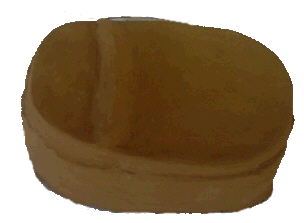
A clay ring used as a stand or seat
Kanzala < Pr. Kan-zala>
A long narrow strip of white cloth or muslin. It is worn like a Christian stole, and before consecration is called nasifa. During baptism it is looped round the staff to secure the latter from falling when planted upright in the riverbed so freeing the baptist’s hands
Kanzi’iil or Kanzi’il <Pr. Kanzi-el>
See Ganzi’il
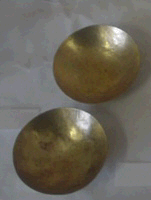
Small ritual drinking bowl
Small ritual drinking bowl
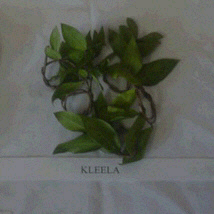
Ksuia <Pr. Ksy-ya>
The tunic which forms part of the ritual dress or rasta
Kukh (Arabic word)
Hut
Kusta <Pr. kush-ta>
(a) “good faith”, “rectitude”, “truth” “sincerity”, “right”, “pact”, “troth”, “promise”
(b) The act of placing the right hand in that of another person is token of and ratification of a pact, oath, or promise. This act is concluded by a kiss, each of the two persons kissing his own right hand when the hand is released.
(c) A being, a personification of truth and good faith
Krun <Pr. Krun or Akrun>
Ruler of one of the realms of darkness, described as " a mountain of flesh ".
Ksuya
See Sadra
Laufa = union, communion <Pr. Lau-fa or lo-fa>
The act of eating a communal sacramental meal in commemoration of a deceased person or persons
Lofani <Pr. Lo-fani>
The same, a popular version of the word Laufa probably from a plural form
Malka <Pr. Mal-ka>
(a) King, also priest, as the crown is the symbol of priesthood. As king, the priest wears the crown of office and a wreath of fresh green leaves which imparts the magic of life to the woven silk fillet (taga).
(b) The word “king” is also applied to spirits, both good and evil, e.g. “The King of Light and King of Darkness”. When modern Mandaeans speak of melki they mean “spirits”, usually good.
Malwasha
Religious name
Mambuha or Mambuga <Pr. Mam-bu-ha, mam-bugha>
(bubbling spirit) Is the name given to the water drunk sacramentally, also to the mingle cup drunk in the masiqta (see hamra). Drinking the mingled cup in the masiqta is an act performed by the celebrant in the character of the deceased: later on, during the same rite, he communicates himself with plain bread and water (pihta and mambuha): this time as a living person.
Mana <Pr. Man-ra>
(a) “Intelligence” “nous” “mind”, as in Mana-Rba-Kabira i.e. the great almighty. Probably a loan word from the Iranian manah “mind, intelligence”
(b) The eternal element in the makeup of Man; the soul
(b) A garment, vestment, robe of honor
(c) A vessel, receptacle.
(d) a house
(e) Mandaeans so term the Ba or dove of the masiqta, meaning probably that the bird is emblematic of the soul.
Manda d Hiia <Pr. Man-dad-hei; accent on second syllable),
A savior spirit sometimes identified with Hibil Ziwa. Like Hibil Ziwa, he is especially concerned with the welfare of mankind.
Manda -- colloquially mandi Pl. mandia <Pr. Man-da>
(a) The name of the sacred enclosure which includes a cult-hut (bimandi) and a yardna (jordan, baptismal pool) also usually a date palm and myrtle bush
(b) Gnosis
Mandaia (plural Mandaiia) <Pr. Man-dayi>
A Mandaean layman in contradistinction to a tarmida priest
Mandaiuta <Pr. Man-dai-utha>
The state of being a layman of the community
Mandelta
A triple betyl
Miriai <Pr. Mirri-aI>
Miriai appears as the Miriai of the Ginza Rabba and Drasa d Yahia and also as the mother of Christ.
Margna <Pr. Margh-na>
The long olive wood staff carried by all priests
Masiqta <Pr. Mass-ekh-tha>
A commemorative sacrament for the benefit of the dead performed by priests only. It is performed with the cult-hut. The word means “raising up” “resurrection”
Maskna <mash-khna>
“dwelling”, “shrine”, “indwelling”. Sometimes used as a synonym for manda as in bit-maskna = bimanda. The word is also used for the hut of instruction built for the initiation of a postulant.
Mhita <Pr. Em-hitha>
“Blow”, “wound”. In ritual texts, the word is applied to a breach, conscious or unconscious, of rules of purity, an error in ritual, or an accidental fault.
Misa <Pr. Mi-sha>
Oil of unction, usually sesame oil prepared by the priest at a baptism. In the masiqta and ‘ngirta the heated sesame is poured with dates in a mortar and the resulting juice is strained into a vessel.
Misra (plural misria) <Pr. misri>
A furrow to shut out pollution and enclose purified areas
Msbuta <Pr. mass-wetta>
Ritual submission at the hands of a priest followed immediately by unction and partaking of the sacraments of bread and water (see pitha and mambuha)
Mshunia Kushta
The eternal and ideal double of the earth
Nasifa
Stole-like strip of white cloth or muslin
Nasurai (plural nasuraiia ) <Pr. Nas-su-rai, na-sur-dyi>
One thoroughly versed in the faith and doctrines of the sect
Nasiruta <Pr. Nas-i-rutha>
The true faith, acquaintance with priestly gnosis. Deep knowledge of priest craft and religion.
Nbat <Pr. En-wat>
This spirit of fertility and life is often invoked in exorcisms, and his name appears constantly in all Mandaean religious literature.
Nhura
see Anhura
Niara
Bowl, or dish.
Nidbai <Pr. Ned-vay>
Silmai and Nidbai (Shelmay and Nedvay) are the two guardian spirits of running water (yardna).
‘ndiruna, ‘(ndrun <Pr. endiruna>
A booth lightly constructed of reeds, palm fronds and other greenery erected temporarily for
(a) a Mandaean wedding ceremony
(b) the use of a postulant and his teacher during the first stage of his ordinance
‘ngirta = letter <Pr. in-gir-tha>
(a) A ceremony performed for the dying. A small phial of misa is placed in the small pocket over the right breast of a dying person'’ tunic and his right hand is taken by an asganda in kusta.
(b) The phial of misa
(c) (Literary) a missive, a letter
‘niania <Pr. Inni-yani>
Literary “responses, answers”. Prayers and psalms, also a name given to a section of collected Mandaean liturgical prayers
Nisimta (Plural nish-matha) <Pr. ni-shimta or ni-shim-tha>
The immortal and pre-existence soull of man.
Nitufta (Plural nitufiata) <Pr.ni-tuf-ta –plural ni-tuf-fiatha>
"a drop" Occasionally used literally but usually as a complementary term applied to heavenly beings of female sex or to female members of a priest’s family
Pandama <Pr. pan-dama>
The long end of the ritual turban when brought over the celebrant’s mouth and beard during baptism and other rituals is so called. Laymen acting as bier-carriers also secure the pandama over the lower part of their faces.
Panja <Pr. pan-ja>
The five intercalary days. Their proper name is Parwanaiia. They occur between the months of Sumbulta (Virgo) and Qaina (Libra).
Parwanaiia <Pr. parwanayi>
The five intercalary days see Panja. The word seems to refer to Parwan (Parwan the White Mountain)
Paisaq (plural peysaq)
Priest debarred from all priestly duties but that of performing marriage rites for women not virgin.
Pihta < Pr. peh-tha>
The sacramental bread.
Ptahil <Pr. Pith-ahil>
Is the son of Hibil Ziwa and Zahriel daughter of Qin. His dubious character is explained by the nature of this mesalliance, the father being of the worlds of light and the mother of the worlds of darkness. He is represented as a creator spirit, who bungles work, which must be completed, by a spirit of light. He is also said to be the son of Abatur. In this text he rules a world creates the earth with the help of demons at the order of Abatur, and shows jealousy of Hibil Ziwa.
Qania
Bottle for sacramental water
Qardum
A demon.
Qauqa
A terra-cotta cube for holding incense
Qin <Pr. Qin>
Mother of many spirits of darkness, and also of Ruha and Zahriel
Qina <Pr. qunna>
(a) a nest, a place where members of a family are collected, hence home “…family”
(b) a collection especially the morsels of ritual food placed on the fatira in the masiqta
(c) rancor, envy, grudge
Quintha
A clay box stand
Rba = “great” plural rabba <Pr. rabbey>
Also teacher (rabbi). Rbai (literally “my teacher”) is used as a title.
Rabuta <Pr. rabb-utha>
(a) “greatness” “majesty”
(b) the office and functions of the ganzibra or priest who instructs and initiates a postulant for priesthood.
Rahbata, rihbata <Pr. rah-batha, reh-baitha>
Literally things spread out. Food-offerings, especially in the Zidqa brika.
Rahmia = “devotions” <Pr. rah-mi>
The name given to a series of prayers for the daily office. These prayers to be said at morning, noon, and sunset, every day of the week. The proper prayers for the day and hour are also recited before any rite can begin.
Rahmi’il <Pr. Rah-mi-el>
An 'uthra; he is much invoked in exorcisms, talismans and love-charms.
Rasta <Pr. rus-ta>
The complete dress, which consists of a tunic (sadra or ksuia), drawers (sarwaia), girdle (himiana), turban (burzinqa), and nasifa. The sarwala has a tie string (tikta or takta) and the ksuia a patch pocket (the dasa or disa). In addition to these a priest has his crown (taga), his ring (sum yawar), and his ritual staff (margna).
Ratna
Modern Mandaean colloquial dialect
Rishama
The minor daily and preliminary ritual ablutions
Ruha <Pr. ruh-ha>
(a) The spirit, the vital breathe that part of Man’s immaterial being which is swayed by physical desires. It originates with every individual, but, when death occurs, goes through purification after rebirth into an immortal state together with the nisimta. The masitqa ensures its rebirth.
(b) The personified Ruha--Daughter of Qin, she was married to her brother Gaf. She was taken to the upper world by Hibil Ziwa, and brought the monster-child 'Ur to birth. She became 'Ur's paramour, and had by him two sets of children, the seven planets and the twelve Houses of the Zodiac.
Myth apart, she is a personification of the Ruha, the emotional and passionate element in human nature. She is usually portrayed as the enemy of the soul, a sorceress and beguiler, in league with the planets to hold the soul back and to frustrate its aspirations towards the worlds of light. Mandaean eschatology represents the Ruha as surviving death like the nisimta (soul). After purification Ruha, and nisimta reunite and rise as one being into the realms of light.
Sa
A roll or scroll of bread used in ritual meals for the dead
Sabbi (plural Sabba)
see Subbi
Sadra <Pr. sud-ra>
See ksuia and rasta
Samandar'il <Pr. Seman-dariel>
Often mentioned in Mandaean literature; an 'uthra, a flower and blossom spirit.
Sarat < Pr. Sha-rat>
A female 'uthra called, " the great, first hidden Vine "
Sarhabi'il <Pr. Shar-hab-yel>
A female ‘uthra, also the name of the wife of the pair who re-peopled the world after its second destruction (by fire). The name comes from the root SRHB "to propagate ". He is also one of Ptahil's sons and rules a purgatory.
Sarifa (Arabic word)
Reed Hut
Sarwaia (Sharwala) <Pr. sar-wai-a>
Loose drawers, part of the ritual dress
Sauri'iil < Pr. Sau-rI-el>
The death angel, who comes to release the soul (nisimta) and detach the ruha from the body.
Sdum (Ash-diim)
Ruler of an underworld—also a "warrior of darkness ", a gate and a demon.
Shaq
The word means " cloud " or " clouds ". Also a son of Yusamin he rules over a purgatory.
Silmai <Pr. Shel-may)
One of a pair of guardian spirits (over running water) (see Nidbai).
Simat <Pr. Si-mat>
" Treasure ". A favorite name with Mandaean women. Here the name or epithet is given to Ruha, a ship, one of Ptahil's wives, and a throne.
Simat Hiia <Pr. Si-mad-Hei>
Accent on second syllable " Treasure-of-Life ".
Usually invoked with Yawar Ziwa. She is more often mentioned than any other female life-spirit, and like ‘Zlat represents the Mother principle of creation.
Simiaiil
A demon, also mentioned in the Ginza & Rabba
Sindirka <Pr. sinndir-ka>
(a) male palm tree
(b) dates
(c) the male principle in creation
Sislam <Pr. Shish-lam>
Usually Sislam Rba. He is the arch-type of priest and bridegroom. His marriage is the pattern for earthly marriages and his initiation and consecration as priest, the model for all such ceremonies (See Tarasa d Taga d Sislam Rba, a manuscript in the British Museum, and Sarh d Qabin d Sislam Rba.
Sitil < Pr. Shi-tel>
Son of Adam Kasia, and son of his human counterpart Adam Pagria. When Adam the first man was told that his span of life had ended, Sitil offered to die in his stead. This filial action made him the purest of all human beings, and the soul of every human being after death is weighed in Abatur's scales against the soul of Sitil. One of Ptahil's sons is named after him, and he rules over a purgatory.
Priest --Ring / Knife
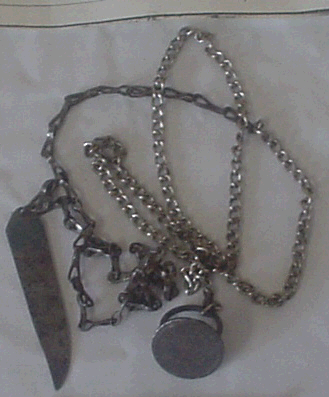
(a) A habitation, abode, resting, place, shecinah or in dwelling
(b) A name given to the cult hut, also to hut of initiation
Sualia (aswali) <Pr. shwall-I>
“asker” postulant. The name given to a candidate for priesthood.
Subbi (plural Subba)
Mandaean --one who immerses
Sum <Pr. shum>
In the 'Niania and Drasa d Yahia, Sum is Shem, son of Noah and is also called Sam. " Sum " can also be merely an epithet.
Tabahata
= dabahata
Tabutha
The sacred food at ritual meals
Taga <Pr. ta-gha>
Crown, ecclesiastically the woven silk fillet worn by a priest as a symbol of his office
Tana (Pr. tanna>
A word of uncertain meaning. Context suggest the following:
(a) a place of glowing heat, a crucible
(b) a matrix
(c) a heavenly being (possibly personified vapor or smoke of incense?)
Tariana <Pr. torri-ana>
A round clay tray or table, standing on a clay ring
Tarmida plural- tarmidia <Pr. tar-mi-da / tar-mi-di>
A priest often called in ritual Mss “a king”
Tauri’il <Pr. Tau-riel>
This 'uthra is often invoked in exorcisms and magic. He is sometimes identified with Yawar and is mentioned in the Ginza Rabba, ‘Niania and other sacred texts. The bull, connected with sun-worship, and symbolical of fertility, had divine honors both in Babylonia and ancient Persia.
Tura
Mountain
‘utra plural- ‘uthria <Pr. uth-ra>
An ‘uthra is a spirit of light and life. Unlike malkia who are sometimes good and sometimes evil, ‘uthras are invariably pure and beneficent
‘Ur < Pr. Ur >
The giant son of Ruha and her brother Gaf, and later his mother's paramour (see Ruha). It is supposed by Mandaeans that the world rests on his back and that the souls of the ungodly and unbelievers are drawn into his mouth and fiery interior. He is represented in sacred literature as rebellious and turbulent.
Yadatan
(see Adatan)
Yalufa
A literate person
Yardna <Pr. yard-na>
Running water, a river, a stream or a pool within mandi-enclosure connected with a river or stream in such a manner that the water is perpetually flowing
Yukabar Ziwa <Pr. Yu-kha-war Zi-wa>
A spirit of light of high rank.
Yusamin <Pr. Yu-sha-min accent on middle syllable>
Just as Sislam is the pattern of perfect priesthood, Yusamin typifies the careless priest.
Yuzataq <Pr. Yu-za-taq>
Holy-Spirit - an epithet attached to Manda d Hiia
Zhara plural- zharia <ePr. zahara / zhari>
(a) “caution”, “warning”, “admonition”
(b) Directions written in close order in books of liturgical prayers etc. intended for the priest celebrating the rite. In general, a zhara corresponds to a "rubric" in a Christian prayerbook. If a long description of the ritual is inserted the word sarh is used;
(c) an insertion. i.e. a place where the name of a person commerated is to be inserted in a prayer.
Zidqa <Pr. zed-qa>
apparently not used in the plural:
(a) "Pious", "righteous" e. g. bhiria zidqa "elect righteous people" (pr. bhiri zedqa);
(b) an oblation, a pious gift, alms, offertory.
Zidqa brika “Blessed Oblation” <Pr. zedqa bri-kha> (no plural)
This is a name given to certain types of ritual meal of very varying character. One type is performed for a wedding, there is also a Zidqa brika for a person who died without the proper rites for the dying and in ordinary dress, and, finally the zidqa brika which follows a masiqta. At this there is an elaborate myrtle ceremony, accompanied by ritual inhalation. The zidqa brika is not performed in the cult-hut,
Ziwa <Pr. zi-wa>
= Radiance. This appears to be an active and male power of light in the mystical teaching or inner gnosis of Mandaeans: whereas nhura (light) represents its female complement.
Zrazta
A scroll on which a protective charm is written